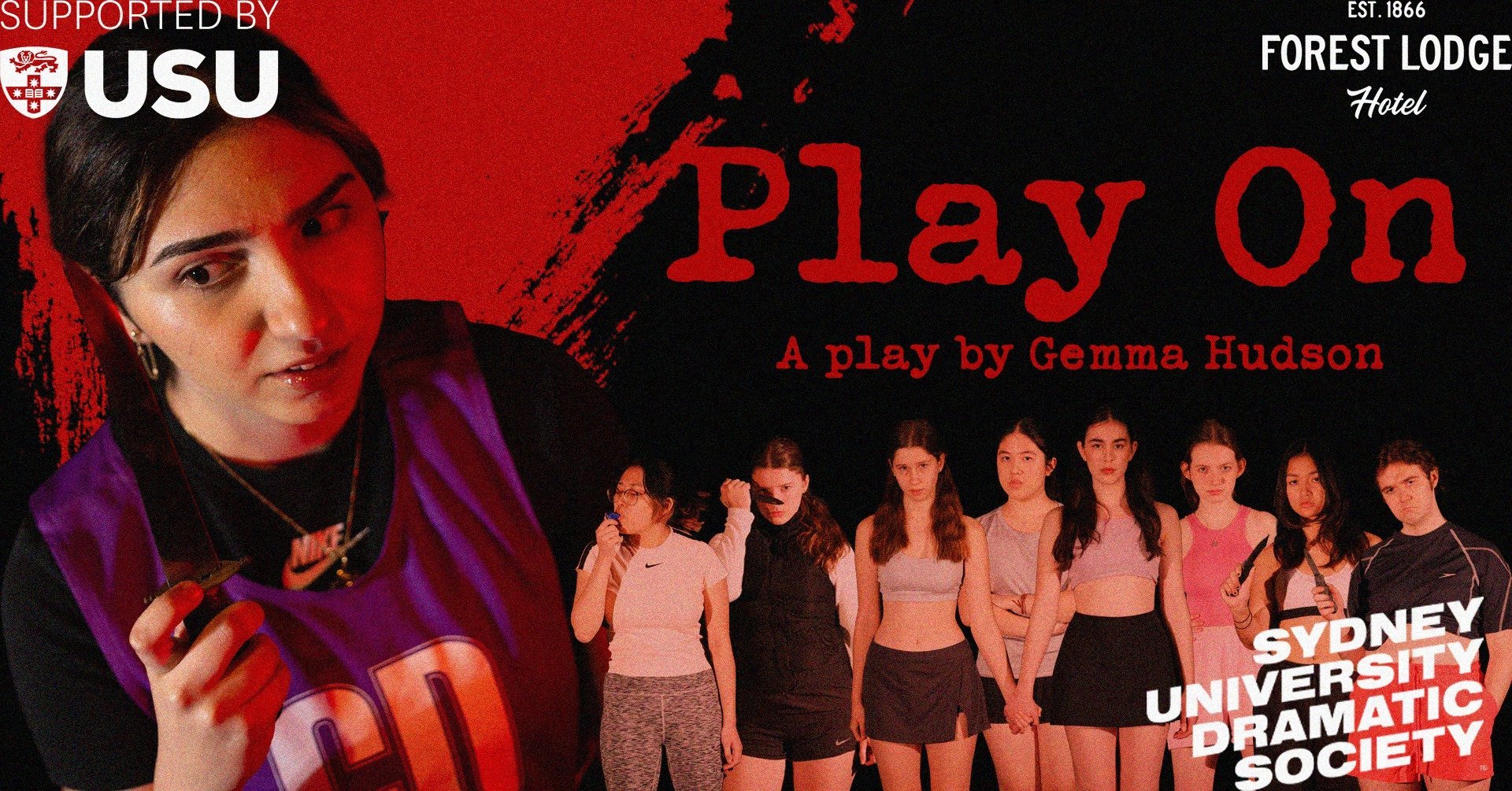Friendship, nostalgia, and isolation: SUDS 'Play On' Review
Play On, written and directed by Gemma Hudson, is an ambitious and exciting cross of And Then There Were None with Heathers.
Image: Play On (courtesy of SUDS)
Warning: Major Spoilers!
Play On, written and directed by Gemma Hudson, is an ambitious and exciting cross of And Then There Were None with Heathers. Combining drama with uncomfortable yet hilarious nostalgia, the production is full of brilliant performances. While not ending as strong as it started, Play On is a joy to watch, highlighting the exciting futures of the cast and crew.
Nominally set at university, the show mostly takes place in what looks like a high school locker room. The walls are filled with drawings and colourful messages with the odd discarded Coke can badly hidden under the bench. We meet a group of Eastern Suburbs girls who have all played netball with each other for years while attending the prestigious St Elizabeth’s.
The play starts as one about fitting in, as Andie (Victoria Georges) attempts to integrate herself into this clique, proving she is good enough for pack leader Bridget (Abby Bobkowski).
Bridget’s power on stage was terrifying. Taking inspiration from Regina George, her posture, perfect plaits and strut make the other players physically contort themselves to avoid getting in her way. This archetype — faced with a new girl — sets up confrontation, but it doesn’t last long. Play On’s examination of cliques and friendships are much less direct. Though public school jokes are thrown around, Andie is quickly accepted into the family. Bridget and Andie bond over their mothers while playing back-to-back. In a very Australian fashion, drinking seems to unite urban and rural more than anything else.
Rather than just fitting in, Play On is about something much scarier to many university students: drifting apart. With Andie performing well, Maddy (Alexis Nguyen) is benched, causing her to storm off. After receiving a threatening letter she attributes to Bridget, she isolates herself further.
In a heart aching scene, we see her in the locker room alone trying to think of a way to prove how much she cares, how much she wants to stay in the group. Feeling secluded by a prank that is “only funny when you are on the other side”, she never makes it back to the game. Her murder on stage is a poignant metaphor for social isolation. She is quickly forgotten by the team as they must play on. Importantly, unlike the later murders, there is no body for the team to find.
Anyone who has ever drifted from a friendship hung on her every word when she stared at her phone begging for a text or any other small form of acknowledgment.
The representation of Netball itself is fascinating. While so important to every character on stage, we never see the game in the foreground. The matches themselves are played behind a series of curtains, only shadows of the girls coming through. While this could be a practical choice more than anything, it highlights how even in team sports what happens off the court matters a lot more.
As the bodies start to pile up in the second act, the play slightly drifts away from what I thought was its most powerful message. The drama of the stabbings, fake blood and all, certainly gripped and shocked the audience, but the increase in pace solved some of the more subtle internal conflicts too quickly.
The inseparable Beatrice (Jadzia Stronell) and Teagan (Zara Podmore) fall out when the latter gets with the former’s boyfriend. Rather than blame him, Teagan focuses her anger on Beatrice. The all-too-common reflex of blaming your friend instead of the cheater never gets the airtime it deserves as both are murdered as soon as the conversation starts. What may be viewed as mere high school drama, Hudon underscores, seeps into adult life as well.
With blood on the floor, the girls inability to respect the space angers The Ref (Mali Lung), who takes the whole audience back to their high school sport days. Rather than ‘boys in the back’, her Mille Ford style impersonation of a teacher provides essential comic relief throughout the production, giving us an instant classic yet largely improvised rant ending with her ex-husband touching “my neighbours balls.”
We eventually learn at the end that it was Cathy (Aqsa Suryana) who had been committing all these murders out of anger towards Bridget, who in her mind, treats her friends as a means to an end (netball victories) and nothing more. The final reveal was well executed, a literal stab in the back caused loud gasps in the audience.
Cathy’s switch from unassuming friend to serial killer was excellent. Her unhinged laughs and sudden movements left me and those next to me visibly uncomfortable. In classic ‘whodunnit’ fashion, no one truly suspected her, I certainly didn’t.
Was it about Netball all along? Cathy certainly wants the audience to think that. Getting Andie into the group to test whether the friendships were real was all part of her masterplan. The murders may dominate the drama as the play goes on, but it's those more passive social tensions that made Play On so gripping.
After 10 years playing netball, Hudson beautifully captures the ups and down of a friend group that depend on netball for their friendship but clearly desire a lot more than just winning, even if Bridget only admits it when a Peach Soju bottle is in her hand.
Play On is showing at Celler Theatre until August 12th.

